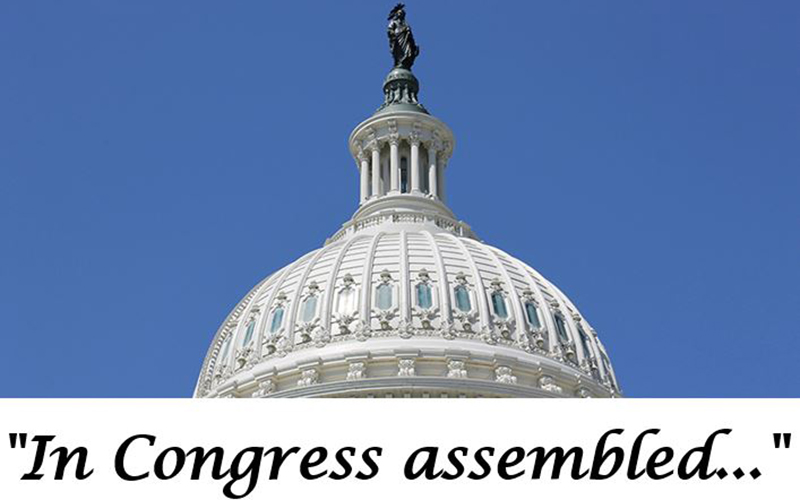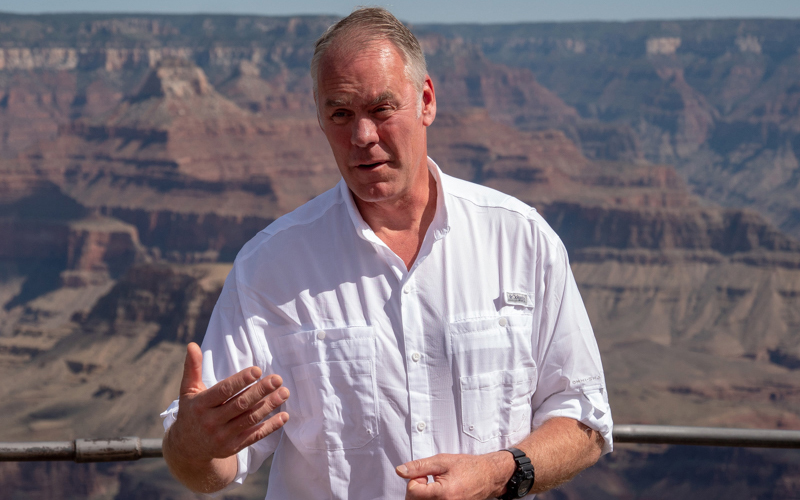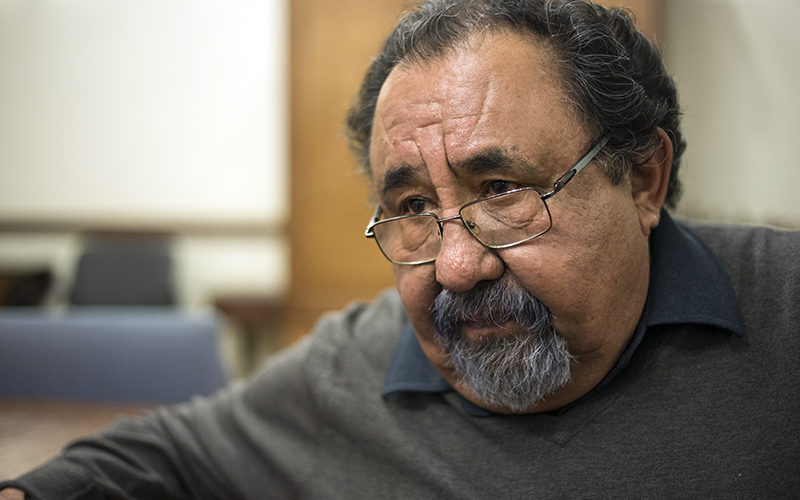WASHINGTON – Rep. Raul Grijalva, D-Tucson, may not take over the House Natural Resources Committee for another two weeks, but that doesn’t mean his potential presence as chairman isn’t already being felt.
Interior Secretary Ryan Zinke, long a target of Grijalva, said last week that he will resign before Democrats take control of the House – when Grijalva will likely take control of the committee overseeing Interior.
It was not the only factor – Zinke had reportedly fallen out of favor with the White House – but the abrupt resignation came just two weeks after Zinke’s blistering Twitter response to a Grijalva editorial that called on the secretary to resign.
Grijalva said in a statement afterward that the resignation was “no kind of victory” but that he hoped it would bring a change in direction for Interior. And he promised that Zinke’s resignation would not mean the end of aggressive oversight of the department by a Democrat-led committee.
“He’s gone, but his decisions and how he reached those decisions, I still believe are open for public review and public scrutiny,” Grijalva said Wednesday in an interview on CNN.
“Those decisions were made, we’re going to be seeking some balance, bringing conservation and science back into the equation … and that’s going to require, on occasion, that we dig a lot deeper than just the surface material that we get from Interior,” he said.
Grijalva is not officially chairman of the House Natural Resources Committee until the next Congress is sworn in Jan. 3 and the Democratic caucus has a chance to vote on committee assignments. But he is expected to get the nod after years as the ranking Democrat on what has been a GOP-controlled committee for the past six years.
Related stories:

A look ahead at the 116th Congress that takes office next month.
• Arizona delegation brings new faces, less seniority to next Congress
• Newly empowered House Democrats set priorities for next Congress
• Immigration reform likely to make – limited – gains in 116th Congress
• New Congress likely to resume torrid pace of judicial nominations
• First in Congress? Get in line, as more women, minorities head to Hill
It’s been a lonely six years for Grijalva, particularly the past two under President Donald Trump, whose administration Grijalva said has converted public lands to “one use, and that’s extraction – gas, oil, mining and timber.” A voting scorecard shows committee votes almost always opposite to Grijalva’s position.
Under Zinke, Interior has also aggressively rolled back regulations from previous administrations and cut the size of several national monuments – including an 85 percent reduction in the Bears Ears monument in Utah, approved by President Barack Obama shortly before he left office.
Grijalva, endorsed by the Sierra Club and with a lifetime voting grade of 96 percent from the League of Conservation Voters, said the department has ignored climate change and worked to loosen rules that he called giveaways to industry.
But where Grijalva sees giveaways, others see progress.
When Zinke’s resignation was announced, the Congressional Western Caucus said he would be missed and praised him for his work to usher in “a new era of policies that have made a positive impact on the West and for rural communities.” Caucus chairman, Rep. Paul Gosar, R-Prescott, said a department proposal this month to get more local input into sage grouse protection was another step “to unwind land grabs by the Obama administration.”
Two days after Grijalva’s USA Today editorial urging Zinke to resign, Rep. Rob Bishop, R-Utah, wrote an editorial in The Hill that called Zinke’s stewardship of Interior “a force for good.” Bishop, the current chairman of the Natural Resources Committee, said public lands are producing more jobs and more revenue, and he praised an Interior reorganization plan that would move some decision-making away from Washington.
“DOI’s leadership has shifted the discussion about public lands back to where it should have been: How best to manage land for the benefit of the people,” Bishop wrote.
Bishop and Grijalva have had something of an odd-couple relationship as leaders of Natural Resources, one that’s likely to continue in the next Congress, when Bishop is in line to be the ranking Republican foil to Grijalva’s chair.
The two were known for locking horns, which made it all the more surprising when they agreed this fall on a compromise plan to save the popular Land and Water Conservation Fund.
That program uses revenues from offshore drilling leases to fund parks and recreation projects. Republicans complained that the 54-year-old program had become a “slush fund” for federal land purchases, while Democrats insisted it should be renewed permanently, not temporarily as it has been.
Despite reaching a compromise on the program this fall, however, it has not come to the floor and could die when this Congress recesses.
It is sure to be one of the first items Grijalva turns to in the next Congress. But the eight-term Democrat has larger goals in his sights.
“We’re not going to spend a lot of time listening to legislation that tears down endangered species or NEPA (the National Environmental Policy Act) or other bedrock environmental laws, we’re going to move into other areas,” Grijalva said recently. “Climate change being one of them, elevating science back into the decision-making of our committee.”

Interior Secretary Ryan Zinke at the Grand Canyon in September for National Public Lands Day. Zinke, facing ethics investigations, said he will resign before the new Congress is sworn on Jan. 3. (Photo by Jordan Evans/Cronkite News)
For his part, Bishop has said he is excited to work as ranking member of the committee and that he plans to push for increased public land availability and a continuation of Trump’s energy policy.
Grijalva said another priority will be accountability and oversight of the Interior Department, to push it back toward it original multi-use focus. Under Bishop’s leadership, he said, “the only mission we see now is expediting extraction and we want to put conservation back on the table.”
“So what we’re saying is now conservation is going to get raised to the equal, balanced status that it belongs,” he said.
And even though Zinke will no longer be in office, Grijalva said the panel will look into what his editorial called the “well-documented scandals” surrounding the secretary. Those include at least one inspector general’s investigation of a Montana land deal Zinke was involved in that has been referred to the Justice Department for possible prosecution.
That op-ed brought the personal Twitter attack from Zinke. He accused Grijalva of being a drunk and said the Tucson Democrat should resign and pay back the “hush money and the tens of thousands” of dollars that Interior has spent “investigating unfounded allegations” from Congress.
Grijalva brushed off the tweet and said his office had been cleared by the Office of Congressional Ethics over the “hush money” – $48,000 in severance pay to a former staffer who claimed a hostile work environment.
Two weeks later, Zinke tweeted that he would resign because he “cannot justify spending thousands of dollars defending myself and my family against false accusations.”
Zinke’s resignation leaves the department, for now, in the hands of Deputy Secretary David Bernhardt, who critics say has just as many conflicts, as a former lobbyist for oil and gas interests.
Grijalva told CNN Wednesday that he did not intend to “jump in the sty and wrestle with Zinke or this administration” over the tweets, but that the committee would continue pressing its oversight. A spokesman said that while “Citizen Zinke may be leaving, but real oversight of former Secretary Zinke has not even started.”
“I don’t see, philosophically, it changing,” Grijalva said of culture of the department under Trump. “But this is, I think, an alert to the Interior that we’re going to hold them accountable regardless. We’re going to question that philosophy.”
